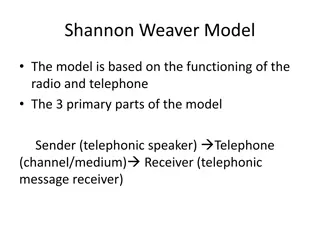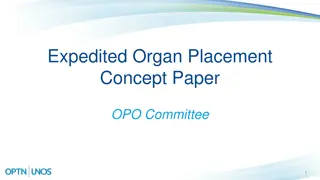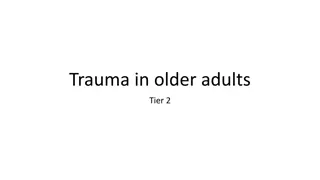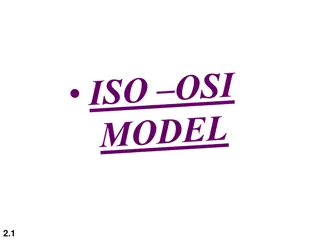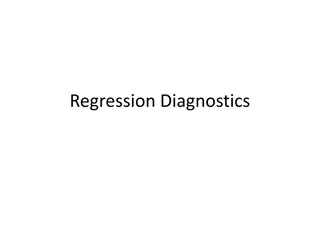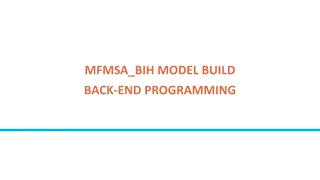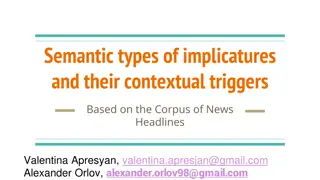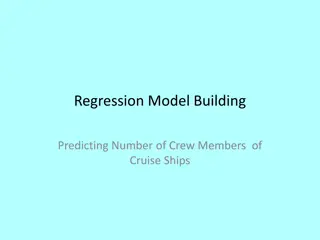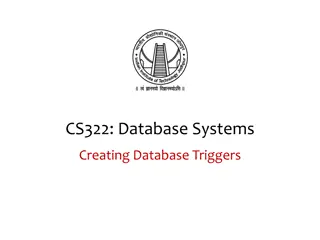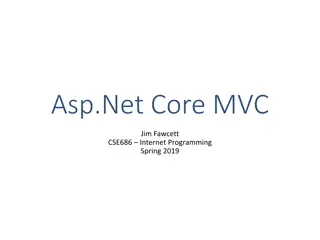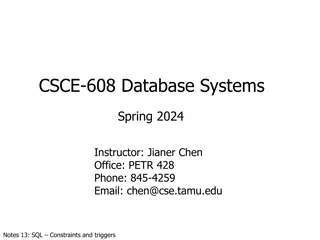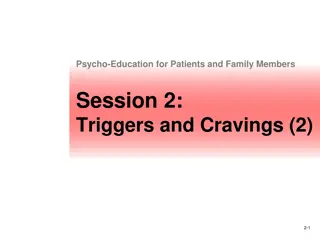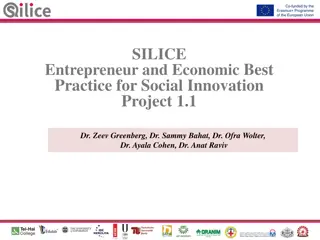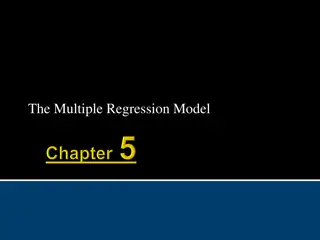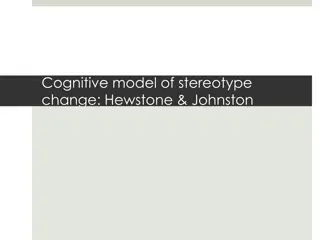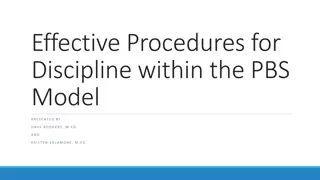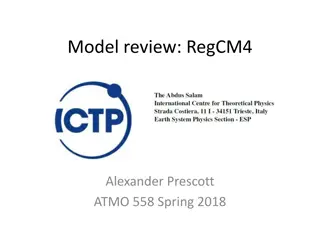Building a Macrostructural Standalone Model for North Macedonia: Model Overview and Features
This project focuses on building a macrostructural standalone model for the economy of North Macedonia. The model layout includes a system overview, theory, functional forms, and features of the MFMSA_MKD. It covers various aspects such as the National Income Account, Fiscal Account, External Accoun
2 views • 23 slides
NAMI Family Support Group Model Overview
This content provides an insightful introduction to the NAMI family support group model, emphasizing the importance of having a structured model to guide facilitators and participants in achieving successful support group interactions. It highlights the need for a model to prevent negative group dyn
6 views • 23 slides
Asthma Management
Asthma is a chronic respiratory condition characterized by inflammation and narrowing of the airways, leading to symptoms like wheezing, coughing, shortness of breath, and chest tightness. Triggers vary and can include allergens, exercise, cold air, and stress. Effective management involves avoiding
1 views • 6 slides
Understanding SQL Triggers in Relational Databases
SQL triggers are stored procedures that are automatically invoked when certain events occur in a database, such as insertions or updates to tables. This article explains the definition of triggers, their syntax, types, and examples of DML triggers in SQL servers. It also covers the concept of row-le
5 views • 19 slides
Psycho-Education for Patients and Family Members: Strategies for Avoiding Triggers
This session delves into identifying triggers that lead to thoughts of substance use, including triggers related to people, places, things, times, and emotional states. Strategies for avoiding these triggers are discussed to support individuals in their recovery journey.
0 views • 20 slides
Understanding Entity-Relationship Model in Database Systems
This article explores the Entity-Relationship (ER) model in database systems, covering topics like database design, ER model components, entities, attributes, key attributes, composite attributes, and multivalued attributes. The ER model provides a high-level data model to define data elements and r
0 views • 25 slides
Communication Models Overview
The Shannon-Weaver Model is based on the functioning of radio and telephone, with key parts being sender, channel, and receiver. It involves steps like information source, transmitter, channel, receiver, and destination. The model faces technical, semantic, and effectiveness problems. The Linear Mod
0 views • 8 slides
Expedited Organ Placement Concept Paper - Addressing Critical Transplant System Issues
This concept paper outlines a proposal to address key challenges in the current organ transplant system, such as lack of transparency and consistency in organ placement. The focus is on developing an expedited placement system with specific triggers and qualifications to improve access to organs for
0 views • 9 slides
Understanding Atomic Structure: Electrons, Energy Levels, and Historical Models
The atomic model describes how electrons occupy energy levels or shells in an atom. These energy levels have specific capacities for electrons. The electronic structure of an atom is represented by numbers indicating electron distribution. Over time, scientists have developed atomic models based on
0 views • 5 slides
Understanding ROC Curves and Operating Points in Model Evaluation
In this informative content, Geoff Hulten discusses the significance of ROC curves and operating points in model evaluation. It emphasizes the importance of choosing the right model based on the costs of mistakes like in disease screening and spam filtering. The content explains how logistical regre
7 views • 11 slides
Understanding Trauma in Older Adults: A Comprehensive Overview
Trauma in older adults is often under-recognized and under-treated. It can have lasting adverse effects on their well-being. Recognizing the signs, responding appropriately, and avoiding re-traumatization are crucial steps in supporting older adults who have experienced trauma. Triggers such as anni
4 views • 12 slides
Understanding the OSI Model and Layered Tasks in Networking
The content highlights the OSI model and layered tasks in networking, explaining the functions of each layer in the OSI model such as Physical Layer, Data Link Layer, Network Layer, Transport Layer, Session Layer, Presentation Layer, and Application Layer. It also discusses the interaction between l
1 views • 41 slides
Regression Diagnostics for Model Evaluation
Regression diagnostics involve analyzing outlying observations, standardized residuals, model errors, and identifying influential cases to assess the quality of a regression model. This process helps in understanding the accuracy of the model predictions and identifying potential issues that may aff
1 views • 12 slides
Psycho-Education for Patients and Family Members: Triggers and Thought Stopping Techniques
Explore various triggers such as people, places, things, times, and emotional states that can lead to thoughts of substance use. Learn effective strategies to avoid and cope with these triggers for successful recovery.
0 views • 20 slides
MFMSA_BIH Model Build Process Overview
This detailed process outlines the steps involved in preparing, building, and debugging a back-end programming model known as MFMSA_BIH. It covers activities such as data preparation, model building, equation estimation, assumption making, model compilation, and front-end adjustment. The iterative p
0 views • 10 slides
Proposal for Radio Controlled Model Aircraft Site Development
To establish a working relationship for the development of a site suitable for radio-controlled model aircraft use, the proposal suggests local land ownership with oversight from a responsible agency. Collins Model Aviators is proposed as the host club, offering site owner liability insurance throug
0 views • 20 slides
Understanding Implicatures: Types and Contextual Triggers in News Headlines
Implicatures are implied meanings that are not explicitly stated, with cancellable nature, in linguistic expressions. This article explores different types of implicatures and their triggers in news headlines, discussing conversational vs. conventional implicatures, terminological debates, and the d
0 views • 40 slides
UBU Performance Oversight Engagement Framework Overview
Providing an overview of the UBU Logic Model within the UBU Performance Oversight Engagement Framework, this session covers topics such as what a logic model is, best practice principles, getting started, components of the logic model, evidence & monitoring components, and next steps. The framework
0 views • 33 slides
Regression Model for Predicting Crew Size of Cruise Ships
A regression model was built to predict the number of crew members on cruise ships using potential predictor variables such as Age, Tonnage, Passenger Density, Cabins, and Length. The model showed high correlations among predictors, with Passengers and Cabins being particularly problematic. The full
0 views • 16 slides
Exact Byzantine Consensus on Undirected Graphs: Local Broadcast Model
This research focuses on achieving exact Byzantine consensus on undirected graphs under the local broadcast model, where communication is synchronous with known underlying graphs. The model reduces the power of Byzantine nodes and imposes connectivity requirements. The algorithm involves flooding va
0 views • 7 slides
Introduction to Database Triggers in CS322
Exploring the world of database triggers, this content delves into various types of triggers, their design guidelines, creating DML triggers, and components of triggers. You'll learn about application triggers, database triggers, trigger firing rules, and how to design triggers effectively to centra
0 views • 43 slides
Understanding Asthma: Symptoms, Triggers, and Management in Schools
Asthma is a common condition affecting many individuals, especially in school settings. This training aims to educate on recognizing asthma, providing support during attacks, available treatments, and school responsibilities. Asthma symptoms include coughing, wheezing, chest tightness, and shortness
0 views • 14 slides
Exploring Diversity and Social Justice in Learning Environments
Delve into concepts such as comfort zones, learning edges, safety, triggers, ground rules, and defining culture in the context of promoting diversity and social justice in educational settings. Discover the importance of challenging ourselves to expand our comfort zones, creating safe spaces for dia
0 views • 13 slides
Calibration of Multi-Variable Rainfall-Runoff Model Using Snow Data in Alpine Catchments
Explore the calibration of a conceptual rainfall-runoff model in Alpine catchments, focusing on the importance of incorporating snow data. The study assesses the benefits of using multi-objective approaches and additional datasets for model performance. Various aspects such as snow cover, groundwate
0 views • 16 slides
Understanding Asp.Net Core MVC - Building Web Applications with Model-View-Controller Pattern
Asp.Net Core MVC is a framework for building web applications based on the Model-View-Controller pattern. The model manages application data and constraints, views present application state, and controllers handle requests and actions on the data model. Learn about the MVC structure, life cycle, mod
0 views • 22 slides
Understanding SQL Constraints and Triggers in Database Systems
SQL (Structured Query Language) provides a high-level approach to database management by focusing on what needs to be done rather than how. Constraints and triggers play vital roles in ensuring data integrity and enforcing specific actions. Keys, foreign keys, value-based constraints, tuple-based co
0 views • 130 slides
Understanding Urticaria: Causes, Types, and Management
Vascular reactions of the skin like hives and nettle rash can lead to urticaria, characterized by wheals, itching, and stinging sensations. Chronic and acute urticaria have distinct classifications and triggers, including drugs, food, infections, emotional stress, and physical factors like cold and
0 views • 22 slides
Identifying Stress Triggers in Educational Environments
This project funded by the European Commission aims to identify stress triggers in school settings that can impact the well-being and learning of both students and teachers. By recognizing elements like materials, spaces, topics, and other triggers that may cause stress, the project focuses on detec
0 views • 26 slides
Understanding X-CAPM: An Extrapolative Capital Asset Pricing Model
This paper discusses the X-CAPM model proposed by Barberis et al., which addresses the challenges posed by investors with extrapolative expectations. The model analytically solves a heterogeneous agents consumption-based model, simulates it, and matches various moments. It explores how rational inve
0 views • 23 slides
Understanding the Addictive Process: Triggers, Cravings, and Phases
Delve into the complexities of the addictive process with a focus on triggers, cravings, and the phases individuals go through when using substances like Shabu. Explore the shift in balance between positives and negatives when substance use extends beyond the maintenance phase, leading to disenchant
0 views • 20 slides
Innovation and Social Entrepreneurship Initiatives in Higher Education
This project focuses on establishing a leading center for promoting innovation and social entrepreneurship within higher education institutions. It aims to encourage students and staff to develop creative solutions for community challenges, expand social involvement, and foster sustainable positive
0 views • 13 slides
Principles of Econometrics: Multiple Regression Model Overview
Explore the key concepts of the Multiple Regression Model, including model specification, parameter estimation, hypothesis testing, and goodness-of-fit measurements. Assumptions and properties of the model are discussed, highlighting the relationship between variables and the econometric model. Vari
1 views • 31 slides
Cognitive Model of Stereotype Change: Three Models Explored
The Cognitive Model of Stereotype Change, as researched by Hewstone & Johnston, delves into three key models for altering stereotypical beliefs: the bookkeeping model, the conversion model, and the subtyping model. These models suggest strategies such as adding or removing features to shift stereoty
0 views • 58 slides
Understanding Bohr's Model of the Hydrogen Atom
Exploring the significance of Bohr's hydrogen model in physics, this lecture delves into the Bohr radius, the correspondence principle, and the success and limitations of his model. Discover how characteristic X-ray spectra contribute to our understanding of atomic structures, leading to the conclus
0 views • 14 slides
Effective Procedures for Discipline within the PBS Model
Discipline within the PBS model focuses on promoting appropriate behavior, decreasing problem behaviors, and ensuring student success. It involves implementing steps, policies, and actions to support learning environments. Strategies include teaching social skills, addressing triggers of problem beh
0 views • 30 slides
Understanding Database Constraints, Keys, and Triggers
Explore the concepts of constraints, foreign keys, local and global constraints, and triggers in the context of database management systems. Delve into topics such as types of constraints, keys, and expressing foreign keys with examples. Enhance your understanding of database integrity and data rela
0 views • 40 slides
Overview of RegCM4 Model Features
RegCM4 is a community model developed since the 1980s, with over 800 scientists contributing to its advancements. It features a fully compressible, rotating frame of reference and a limited area dynamical core based on the Penn State/NCAR Mesoscale Model 5 (MM5). The model uses hydrostatic and nonhy
0 views • 14 slides
Managing Database Triggers for Error Handling and Examples
Explore the concept of database triggers, specifically focusing on error management scenarios and practical examples for INSERT, DELETE, and UPDATE operations in relational database systems. Learn how triggers can be utilized to maintain data integrity and handle errors effectively.
0 views • 17 slides
Understanding Depression and its Management by Dr. Priyanka Shukla
Learn about the typical symptoms, common triggers, cycle of depression, and challenging ways to manage depression as explained by Dr. Priyanka Shukla, an Assistant Professor and RCI registered Clinical Psychologist. Recognize life triggers, understand core beliefs, identify feelings, and take a deto
0 views • 7 slides
Understanding SQL Triggers: A Comprehensive Guide
SQL triggers are program units that are executed based on certain events like updating or deleting data in a table. By defining triggers, you can specify actions that will cause them to fire, enhancing data integrity and automating processes. Learn about trigger creation, association with tables, an
0 views • 20 slides






